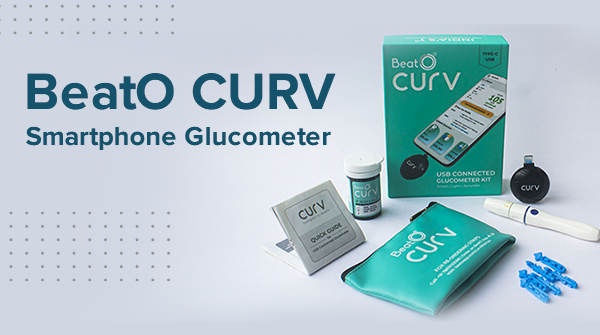Type 2 diabetes is a condition where your blood sugar levels elevate and you develop insulin resistance. Insulin resistance occurs when your body is no longer able to respond to insulin properly, causing it to be unable to fully absorb and use the sugar from the food you eat for energy. As a result, the sugar remains in your blood and can eventually build into a chronic disease that can lead to major health problems, if not treated and managed properly. However, when type 2 diabetes is diagnosed early, this condition is completely reversible, and many of the symptoms and complications can be avoided. Read more to know about diabetes reversal in detail.

Dr Navneet Agrawal, (Consulting Physician & Diabetologist) shares, “diabetes reversal in T2 DM is dependent on several patient factors such as the age of the patient, body weight, c-peptide levels, duration of diabetes, enthusiasm/education to reverse diabetes, and unconditional support from friends and family”.
Tips for a Successful Diabetes Reversal
Dr Agarwal proposes the6S Theoryto reverse type 2 diabetes.
i) Sensible Sustenance (Particularly in Diet)
Nourishment is a key to healthy living for all of us; however, it becomes necessary to eat healthy if you have chronic health conditions such as diabetes, blood pressure or thyroid, etc. If you are keen enough to reverse your type 2 diabetes, then you have to follow balanced nutrition by avoiding excessive carbohydrates.
Yes, fat can be helpful for you! Eat more unsaturated fats to keep yourself full and healthy. Unsaturated fats, which are liquid at room temperature, are regarded as healthy fats because they can lower blood cholesterol, reduce inflammation, normalise cardiac rhythms, and perform a variety of other functions. Unsaturated fats are mostly found in plant-based foods such as vegetable oils, nuts, and seeds.
ii) Structured Physical Activity
Being active makes your body more sensitive to insulin (the hormone that permits cells in your body to utilize blood sugar for energy), which aids with diabetes management. Physical activity also aids in blood sugar regulation and reduces your chances of heart disease and nerve damage. Apart from this, exercise will also aid you in maintaining a healthy weight.
When you exercise, your body releases certain hormones that make you feel happy and sleep better. You can start with walking, jogging, swimming and later on incorporate workout into your daily routine.
iii) Stress Management
If you are wondering why your blood sugar levels, despite all efforts, are not getting under desired range, then you should check on your stress and anxiety issues. Stress is one of the biggest barriers to your ability to control diabetes. It’s likely that you might forget to follow your diabetes medicine due to stress. Although you cannot totally eliminate stress from your life, there are numerous methods for reducing it. You can also help keep your diabetes under control by learning to manage stress effectively. Plus, with less stress, you’ll have more energy to eat well, exercise, and monitor your blood sugar.
iv) Sleep Hygiene
Having stress-relieving techniques at your disposal can also help you sleep better. That’s fantastic because not getting enough sleep might cause your blood sugar to spike. Sleep deprivation increases ghrelin, the hunger hormone, while decreasing leptin, the hormone that makes us feel full. People who sleep poorly may be more prone to seeking relief in foods that elevate blood sugar and put them at risk of obesity, which is a risk factor for diabetes, to compensate for lower energy levels. Get a minimum of 8 hours of sleep to speed in your reversal process.
v) Stopping Substance Abuse
Substance abuse is defined as the excessive use of a substance, such as alcohol or narcotics. It causes severe clinical impairments. It can also lead to a loss of the ability to function socially. Individuals with diabetes need to be extra cautious before having alcohol. Women with diabetes are typically advised to limit their alcohol consumption to one drink per day, while men with diabetes are encouraged to limit their alcohol consumption to two drinks per day. Avoid addiction to live a cleaner life!

vi) Self-control and self-care
Be it food, inactive lifestyle, alcohol, etc, you have to practice self-control effectively. Self-care and self-control are suggested as ways for a person with type 2 diabetes to decrease the effects of the disease. Self-care is defined as a combination of actions involving nutritional, physical, medication, and glucose monitoring practices carried out by the patient to maintain his health while reducing hypoglycemia and excessive weight gain.
Self-control is the subject’s monitoring of his or her own health and illness conditions based on objective criteria acquired from biochemical testing of blood glucose. Ensure to monitor your glucose levels regularly via aglucometer.
However, the reversal of type 2 diabetes is dependent on some patient factors that can be understood withABCDEF theory:
A – Age of patient
B – Body Weight
C – C peptide levels
D – Duration of diabetes
E – Enthusiasm/education
F – Family/friends Support
BeatO Comprehensive Diabetes Care Programs are scientifically proven and help people with type 2 diabetes and pre-diabetes start their journey to diabetes reversal. Rather than focusing on weight loss alone, the program addresses the root causes of type 2 diabetes and prediabetes, which are carbohydrate intolerance and insulin resistance, so that you can improve your metabolic health effectively. Give a missed call at 740-1000-100 to control your diabetes with experts.




